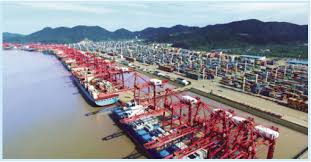New Covid quarantine rules for cargo workers at key gateways in China are putting air cargo supply chains under pressure.
Over the last few weeks, Covid cases in China have begun to pick up as the country contends with the contagious Delta variant of the virus.
To contain outbreaks, lockdowns and stricter quarantine measures have been put in place which is having an impact on cargo operations at both airports and seaports.
According to supply chain risk analyst, Everstream Analytics, pickup and delivery services, as well as air cargo operations have seen the most disruptions, with 15 airports identified as having been affected.
The analytics firm said that Nanjing Lukou International Airport and Yangzhou Taizhou International Airport had both been temporarily closed earlier in August.
Meanwhile, earlier this month Beijing airport had been operating at around 43% capacity, Shanghai Pudong at around 33% capacity and Xiamen Airport (XIN) at 66%.
Each airport has cancelled hundreds of flights.
“Furthermore, due to several crew members testing positive for Covid-19 and thereby impacting labor availability, China Cargo Airlines and China Eastern Airlines have suspended passenger belly freighters until the end of August,” a report from Everstream Analytics said.

“The situation is likely to cause airport congestion and delays and trigger further rate increases due to lost air cargo capacity. Major airports in China have restricted operations to undertake virus disinfection work and as a result, shortages in flight capacity and staff have been reported.”
The most affected airport is Shanghai Pudong where ground handling staff are working for seven days, quarantining at a hotel for seven days and then quarantining at home for seven days.
Flights are being cancelled from Asia due to local Covid-19 outbreaks forcing airlines and ground handlers into operating under restrictions.
This has impacted capacity, which has subsequently driven up rates. Some areas in Asia are more impacted than others, however, the overall market situation remains difficult.
Manufacturing and production operations are also reported to have been affected.
NINGBO PORT
Following the suspension of operations on the 18th August at Ningbo Meidong Container Terminal over a single Covid case has given rise to wider fears for the supply chain as the Delta variant outbreak in China continues to spread.

Tackling its largest Covid outbreak since the onset of the pandemic in early 2020 China continues to operate a zero-Covid strategy of travel restrictions, locking down cities, and testing entire populations, when cases spring up, according to Seatrade Maritime News, Colchester, UK.
In the case of Ningbo Zhoushan Reuters reported that a single employee of the Meidong terminal had tested positive for Covid-19. The employee who was fully vaccinated with the Sinovac vaccine was believed to be asymptomatic. It is not yet known if the infection is the Delta variant strain, which Sinovac appears to have limited in efficacy against.
“Meidong firm immediately stopped all operations and shut down the port area after the Covid-19 test of the staff showed positive,” said Jiang Yipeng, deputy general manager of Ningbo Zhoushan Port. The terminal is currently locked down with no movement of vehicles in or out and operations shutdown. All close contacts have been placed under observation and no more cases were reported till now.
The immediate impact of the closure is expected to be on the members of the Ocean Alliance – Cosco, CMA CGM and Evergreen – primarily using the terminal.
While container line Hapag-Lloyd told its customers: “With this sudden suspension, we expect a delay in planned sailings that might affect your cargo planning. Please know that we are working on alternatives, and hope for your understanding on a matter that is beyond our control.”
The terminal handles around 25 per cent of the volumes at the world’s fourth largest container port Ningbo Zhoushan which has a throughput of 18.68 million TEU in the first seven months of 2021.
In terms of Ningbo – Zhoushan two key concerns will be how long will the closure last and more cases being found at other terminals resulting a wider scale shutdown of facilities at the key port. An outbreak earlier this year at Yantian International Container Terminal (YICT) resulted in a three-week shutdown and major disruption to container shipping with ripple effects felt across trades globally.
Further disruptions at ports could come at a critical time for container shipping and the supply chain as the sector moves into it peak season. Delays between China and Europe and North America have been growing to 7.5-8.5 days on average on key China-Europe port pairs. Meanwhile the US West Coast ports of Los Angeles and Long Beach have seen congestion rising again.
Should more major Chinese terminals stop operations due Covid outbreaks it could lead to the worst disruption the sector has seen since the start of the pandemic.
SANDY MCINNES
MPL NEWSLETTER EDITOR











